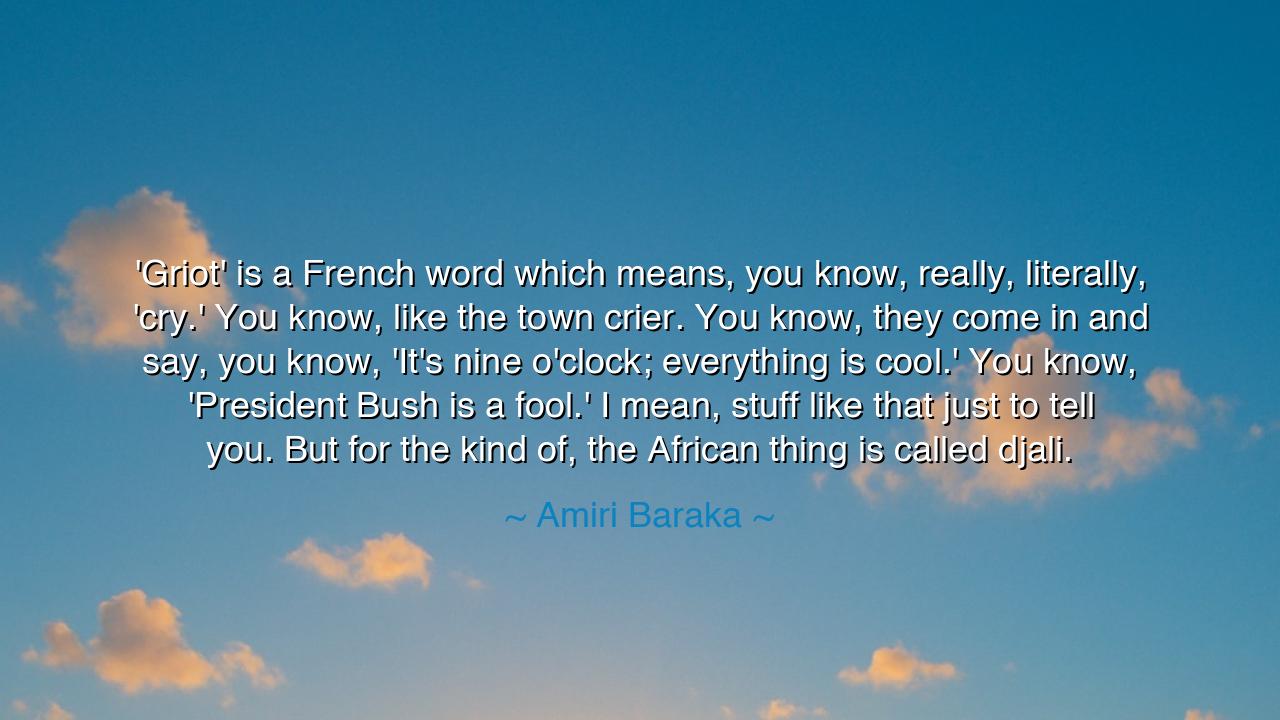
'Griot' is a French word which means, you know, really
'Griot' is a French word which means, you know, really, literally, 'cry.' You know, like the town crier. You know, they come in and say, you know, 'It's nine o'clock; everything is cool.' You know, 'President Bush is a fool.' I mean, stuff like that just to tell you. But for the kind of, the African thing is called djali.






In the vast, sweeping currents of human culture, there exist voices that transcend the limitations of time and place. These voices are the storytellers, the custodians of memory, the griots of the world. Amiri Baraka, a poet and philosopher whose voice echoed through the tumult of the 20th century, speaks to this sacred tradition when he shares the meaning of the word ‘griot’. He says, "'Griot' is a French word which means, you know, really, literally, 'cry.' You know, like the town crier. You know, they come in and say, you know, 'It's nine o'clock; everything is cool.' You know, 'President Bush is a fool.' I mean, stuff like that just to tell you. But for the kind of, the African thing is called djali." These words carry a deep resonance, for they call attention to the vital role that storytelling plays in shaping culture, identity, and the very fabric of society.
The term griot—as Baraka explains—comes from the French and carries the meaning of one who cries out, one who delivers news and stories, often in the form of public proclamations. In many ways, the griot acts as a bridge between the present and the past, a herald who preserves the voice of history for future generations. The town crier serves as a parallel, a figure who would announce news to the community, sometimes mundane, sometimes urgent, but always bringing people together through shared information. But as Baraka highlights, the role of the griot is not merely to report the news but to inject it with significance, to shape the story and give it meaning through the art of oral tradition.
In the ancient African tradition, the djali—the griot’s counterpart—holds an even more sacred role. These storytellers are not simply announcers of events but the preservers of history, culture, and identity. Their role is to sing the praises of ancestors, to recount the deeds of kings and queens, and to teach the people through songs, poetry, and proverbs. Griots and djali were more than just witnesses to the world; they were the creators of the collective memory of the people. They kept the spirit of the community alive by ensuring that stories were passed down, so that each new generation could understand its place within the greater narrative.
Consider the example of Mansa Musa, the great emperor of the Mali Empire, who in the 14th century embarked on a legendary pilgrimage to Mecca. His wealth was so vast that it reshaped economies along the way, yet it is through the words of the griots that his story has been immortalized. The griots did not just recount the facts of his journey—they infused the tale with moral significance, painting him as a figure of divine favor and extraordinary wealth. This act of storytelling transformed a mere historical event into a lasting myth, ensuring that Mansa Musa’s legacy would endure for centuries. The power of the griot is in the ability to elevate a moment in time, to breathe life into it and preserve it for future generations, for those who may never have lived through it.
In the context of Baraka’s work, the griot is also a critical voice, one who does not merely celebrate the past, but who holds power to challenge the present. Baraka’s reference to President Bush and the use of the griot’s voice to call out societal issues reflects the activist spirit of the griot tradition. Much like Sojourner Truth or Frederick Douglass, who used their voices not just to preserve history but to fight for justice, the griot’s task is to engage with the present moment, to speak truth to power and ensure that the story being told includes the voices of the oppressed, the marginalized, and the forgotten. Baraka’s griot is one who raises consciousness, who disturbs the comfortable, and who ensures that history is written from all perspectives.
The lesson here is clear: the role of the griot, whether in ancient Africa or modern society, is not only to preserve but to engage. It is to shape the narrative of the people, to challenge the injustices of the world, and to ensure that the voices of the forgotten are not lost. The griot has a sacred duty to remind us of our shared humanity, to speak truth in times of silence, and to call out what is wrong when others remain mute. It is a task that requires both wisdom and courage, for the griot is not merely a passive recorder of events but an active participant in the shaping of society’s conscience.
In our own lives, we must learn to embrace the role of the griot—not necessarily as musicians or storytellers, but as those who are willing to speak truth in the face of injustice and ignorance. We must find our own voice in the stories that are unfolding around us, whether in our communities or in the larger world. The griot teaches us that our voices matter, that our stories can shape the future, and that the power to change the world lies not only in the hands of the powerful but also in the words of the ordinary. Let us all take up the mantle of the griot, ensuring that the stories we tell reflect the truth, the wisdom, and the dreams of all the people.






AAdministratorAdministrator
Welcome, honored guests. Please leave a comment, we will respond soon